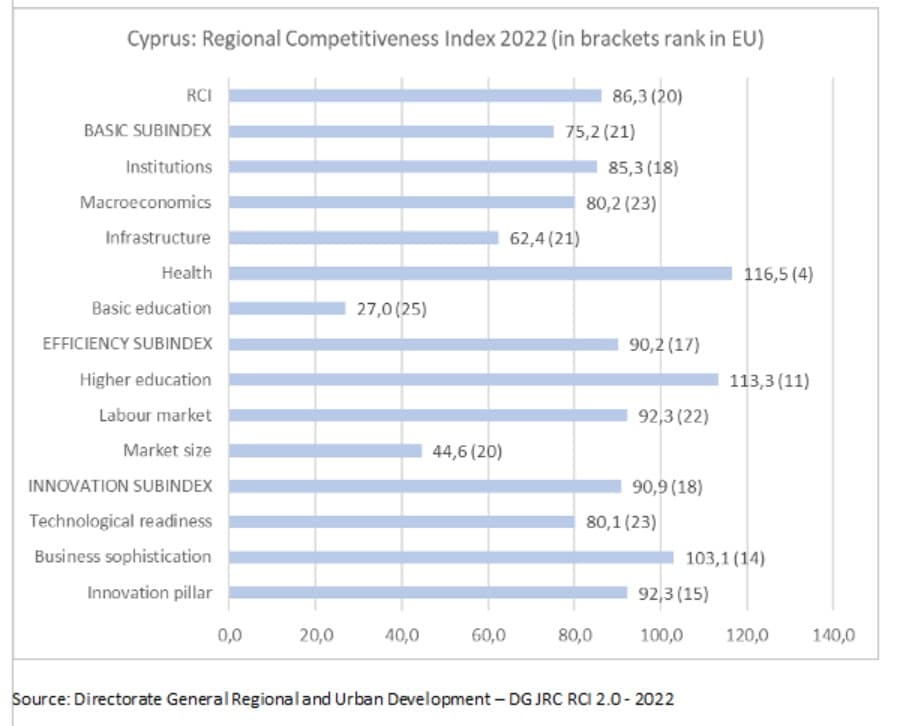The European Commission has just published the 2022 edition of the ‘EU Regional Competitiveness Index’. Published every three years since 2010, the Index has been measuring ‘the ability of a region to offer an attractive environment for firms and residents to live and work.’
The index is a composite measure of 68 underlying indicators grouped into 11 pillars and three sub-indices – the basic, the efficiency and the innovation sub-indices. Indices are computed on a reginal and national basis, and by sub-index and by pillar. The 2022 edition of the index builds on an updated methodology and therefore it is referred to as Regional Competitiveness Index – RCI 2.0.
Cyprus scored below the EU27 average, with an index value of 86.3 and rank 20, in comparison to the EU27 average index value of 100. This is a deterioration from 2019, when the index value was 88.1 and ranking 15. The Netherlands achieved the highest Index value, 135, while Romania was bottom with 55.

Encouragingly, Cyprus ranked above average in three pillars: health, higher education, and business sophistication. However, it ranked below average for the remaining 8 pillars, performing very badly in basic education, macroeconomics, technological readiness, and infrastructure. Rankings in these pillars were from 21 to 25 out of 27. In basic education Cyprus had one of the lowest scores, 27 in absolute terms, comparison the EU27 average of 100.
The report points out that, in general, more competitive regions also have a higher GDP per head, with this relationship being more pronounced for less developed regions and less so for richer regions.
Women achieve more in more competitive regions. Conversely, most regions with a below-average Index have a low level of female achievement. Achieving gender equality is an important objective in its own right, but it could also have a positive impact on economic growth. It should also be an important objective for Cyprus.
The report states that, ‘given their vulnerable situation in the labour market, young people (15–29 years old) have been heavily hit by the recent crisis that followed the COVID-19 pandemic.’ An interesting finding is that recent graduates find jobs faster in more competitive regions. This is particularly important as, ‘along with GDP per capita, employment has traditionally been regarded as the main economic outcome to assess the degree of competitiveness of a country or region.’
The 2022 edition shows large differences in regional competitiveness in the EU. The lowest scores are concentrated in regions of the eastern EU Member States, followed by those of southern EU Member States. North-western States, Netherlands, Belgium, Luxemburg, Denmark, Sweden, Germany, and Finland did particularly well.
The report concludes that ‘the performance of all regions matters for a country’s competitiveness. Public policies and investments should promote upward convergence, which helps less competitive regions to improve their performance and catch up, while ensuring that the most competitive regions continue to thrive.’
More competitive regions have significant advantages in economic development: GDP per capita is higher, women perform better, and they are particularly attractive for recent graduates, as it is easier to find a job there.
With Cyprus aspiring to improve its competitiveness within Europe, but also globally, it should heed the findings of this report.
Charles Ellinas is a Senior Fellow at the Global Energy Centre of the Atlantic Council. This piece is also posted on the blog of the Cyprus Economic Society.







Click here to change your cookie preferences